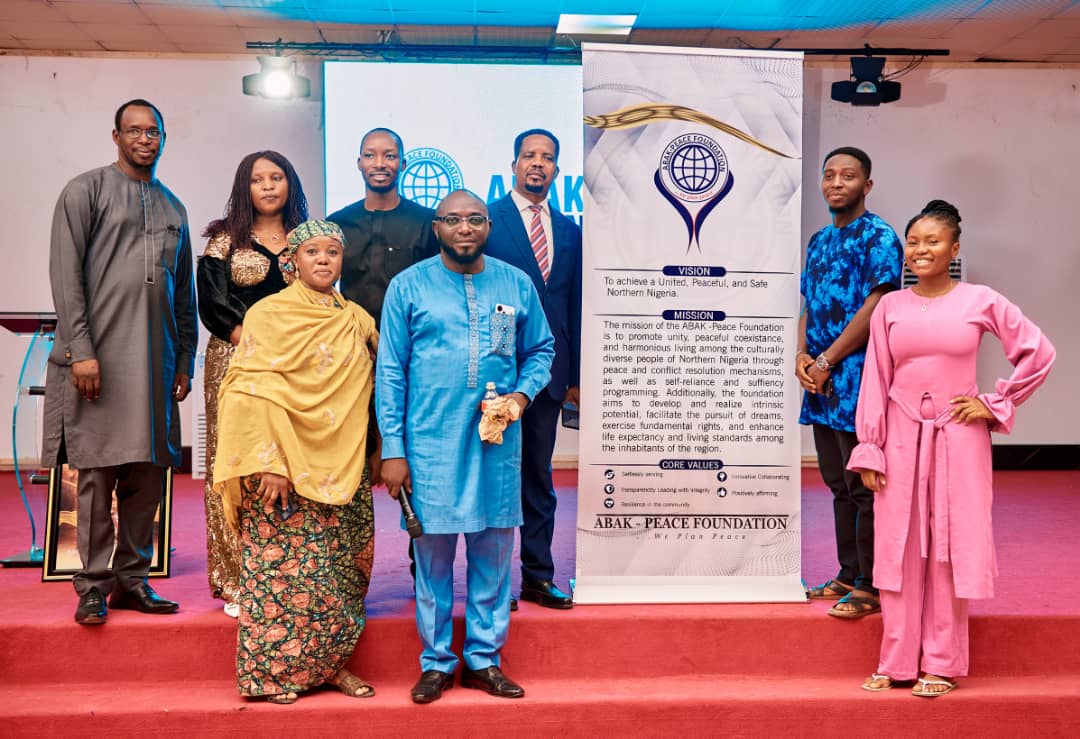
2024 PEACE CELEBRATION: Cultivating a Culture of Peace
2024 Peace Celebration: Cultivating a Culture of Peace Empowering Leaders to Sow the Seeds of Peace Overview In commemoration of the United Nations’ International Day of Peace 2024, themed “Cultivating a Culture of Peace”, the ABAK Peace Foundation hosted a distinguished celebration at the Banquet Hall of the Adamawa State Government House. This event was not merely a symbolic gathering, it was a deliberate step toward embedding peace as a societal norm, transforming it from an abstract ideal into a lived reality. While the global theme emphasizes nurturing everyday habits that reinforce peace, ABAK’s adapted theme, “Empowering Leaders to Sow the Seeds of Peace”, focused on equipping key influencers across multiple sectors. The Foundation’s conviction is clear: lasting cultural transformation begins with leaders who guide, shape, and represent diverse communities. When these leaders embrace the values of peace, their influence cascades down to families, congregations, workplaces, and communities at large. Event Highlights Venue: Banquet Hall, Adamawa State Government House Purpose: To educate and empower a cross-section of leadership, religious, political, tribal, industrial, women, youth, media, and civil society, on instilling peace within their spheres of influence. Activities: Professional lectures, interactive sessions, and open dialogues on how leaders can embody and transmit a culture of peace through their influence, communication, and actions. Significance of the Gathering By strategically engaging leaders with broad societal reach, ABAK Peace Foundation is nurturing a multiplier effect: leaders who are transformed in their perspectives on peace become catalysts for harmony in their communities. This approach helps foster inter-communal trust, build resilience against conflict, and accelerate socio-economic growth through stability. Context Northern Nigeria has, for decades, faced complex challenges, ethno-religious violence, farmer-herder clashes, terrorism, and banditry. These recurring issues have fueled poverty, slowed development, and weakened the bonds of unity. Despite the region’s predominantly Christian and Muslim population, repeated cycles of mistrust and intolerance have eroded peaceful coexistence. It is within this challenging landscape that the ABAK Peace Foundation, under the visionary leadership of Ambassador Bernard Andrew Kaigama, recognized the urgent need for deliberate peace education, conflict resolution training, and platforms for dialogue. Objectives of the Peace Conference The 2024 Peace Celebration sought to: Promote dialogue and understanding among diverse ethnic and religious groups. Educate participants on practical conflict resolution strategies. Foster collaborative networks among key stakeholders for peacebuilding. Key Issues Discussed 1. The Role of Civil Society Organizations in Peacebuilding – Facilitating dialogue, promoting reconciliation, and amplifying marginalized voices to address root causes of conflict. 2. The Role of Government in Peacebuilding – Developing policies, enforcing laws, protecting human rights, and partnering with civil society for inclusive peace efforts. 3. The Role of Civil Society in Good Governance – Promoting transparency, accountability, and civic participation to strengthen democratic institutions. 4. Causes of Conflict and How to Resolve Them – Tackling political, economic, social, and cultural triggers through mediation, negotiation, and inclusive justice mechanisms. 5. Consequences of Lingering Crises – Examining how prolonged instability disrupts economic, social, and community life while perpetuating cycles of violence. 6. Community Thrives Only in an Atmosphere of Peace – Emphasizing that peace creates the environment for education, healthcare, and economic progress. 7. Managing Diversity – Fostering inclusivity, dialogue, and respect for differences in ethnicity, religion, and culture. Celebrating Peacemakers In recognition of exceptional contributions to peaceful coexistence, ABAK Peace Foundation honored select individuals with awards during the event. These awardees, drawn from various walks of life, serve as living examples that peace is not only possible but achievable when pursued with dedication and courage. By highlighting such role models, the Foundation inspires others to embrace peaceful solutions to conflict. Sustained Impact and Future Plans If consistently replicated, engagements like the 2024 Peace Celebration will: Strengthen inter-communal harmony and reduce conflict incidence. Foster community trust and participation in peacebuilding. Accelerate socio-economic development through stability and unity. Empower youth and women as active agents of transformation. Building on the success of the 2024 United Nations’ International Day of Peace celebration, ABAK Peace Foundation will: Organize follow-up workshops and seminars to deepen peace education. Launch community-based initiatives to address specific local conflicts. Continue to collaborate with government, private sector, faith groups, and media to sustain peacebuilding momentum. Invitation for Collaboration To scale up these efforts across Nigeria and beyond, ABAK Peace Foundation welcomes partnerships with: Government Ministries & Agencies – for institutionalized peace education and supportive policies. International Donors & Development Agencies – for technical and financial support in key thematic areas. Private Sector Leaders & Foundations – to sponsor programs in livelihood, education, and community development that underpin peace. Faith-Based Organisations & Media – to amplify messages of unity and reconciliation. Commitment to the Mission Peace remains the core mission of the ABAK Peace Foundation. By proactively addressing the root causes of conflict, building bridges across divides, and empowering leaders to be ambassadors of harmony, the Foundation is laying the groundwork for a united, prosperous, and peaceful Northern Nigeria. The 2024 Peace Celebration stands as a testament to what can be achieved when vision meets action, and when communities, leaders, and institutions unite for the shared goal of peace.